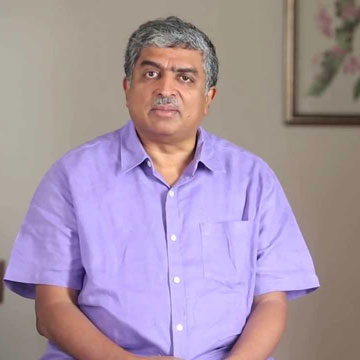 Nandan Nilekani
Nandan Nilekani, the first Chairman of the Unique Identification Authority of India (UIDAI), and considered one of the chief architects of Aadhaar, says the NDA government’s Aadhaar Bill has enough safeguards and this is probably the most stringent law on privacy till date in India.
“In fact, this (the Bill on privacy) is stronger than the original Bill. The Bill has very robust privacy protection beyond what any other legislation has ever provided in India. It is as good as it gets,” Nilekani told The Indian Express.
The Aadhaar (Targeted Delivery of Financial and Other Subsidies, Benefits and Services) Bill, 2016 clearly specifies that the biometric information captured will be used only for Aadhaar enrolment and authentication. It will not be used for any other purpose nor shared with anyone. Such information will not be published or displayed publicly. Further, the authority cannot reveal the biometric information to any institution requesting authentication for a specific purpose.
The only exception to privacy protection that the Aadhaar Bill, 2016 provides is for reasons of national security. An individual’s information may be revealed in the interest of national security if a joint secretary in the Central government issues such a direction. Here, too, the decision will be valid for six months, and has to be reviewed by an Oversight Committee comprising the Cabinet Secretary and the secretaries of Legal Affairs and Information Technology.
While this has sparked a debate on privacy being compromised in the name of the vaguely defined national security, the UPA government’s National Identification Authority of India Bill of 2010 too provided for such an exception in the interest of national security. The only difference is that the joint secretary had to take the approval of the Minister-in-charge. In the Aadhaar Bill, 2016, it is the highest level bureaucrat (Cabinet Secretary-led oversight committee) and not a political committee.
According to Nilekani, “World over every database is open for national security. In any country, national security concerns provides for authorities to access any system. The question is whether anyone will misuse it. The Aadhaar Bill has enough safeguards, and its privacy constraints are stronger than the previous Bill. It is a big leap forward in the quality of legislation India has seen.”
Arghya Sengupta, Research Director, Vidhi Centre for Legal Policy, who assisted the NDA government in drafting the Aadhaar Bill, said personal privacy and personal data protection are two distinct issues. “My personal privacy is different from data protection. Of course, we need a separate privacy law. That is a big gap in the system. But as far as privacy of personal data and its protection is concerned, the Aadhaar Bill is a beta version of the privacy law will look like,” he said.
Explaining the rationale behind a bureaucrat-led oversight committee instead of a political committee (the earlier Bill provided for clearance by a minister-in-charge) to review a direction by a joint secretary, Sengupta said, “National security is not a prerogative of Parliament, but of the government.” While the possibility of misuse will always exist, the ultimate guard is the courts, he added.
 Nandan Nilekani, the first Chairman of the Unique Identification Authority of India (UIDAI), and considered one of the chief architects of Aadhaar, says the NDA government’s Aadhaar Bill has enough safeguards and this is probably the most stringent law on privacy till date in India.
Nandan Nilekani, the first Chairman of the Unique Identification Authority of India (UIDAI), and considered one of the chief architects of Aadhaar, says the NDA government’s Aadhaar Bill has enough safeguards and this is probably the most stringent law on privacy till date in India.